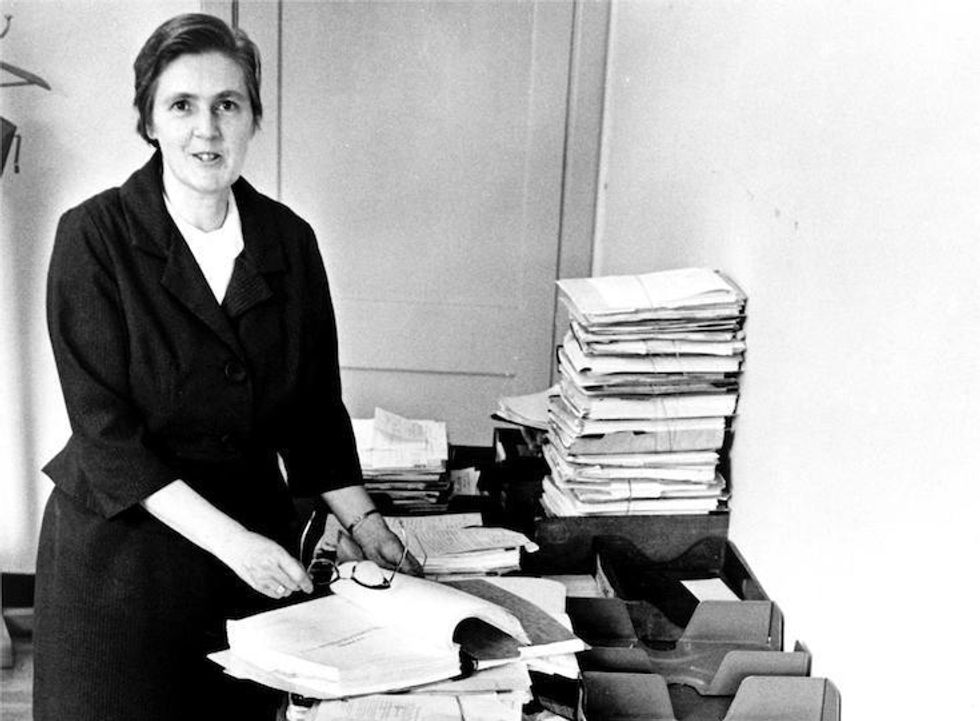Dr. Frances Oldham Kelsey had only been working at the Food and Drug Administration for about a month when she was assigned to review a drug called thalidomide for distribution in America.
Marketed as a sedative for pregnant women, thalidomide was already available in Canada, Germany and several African countries.
This could have been a very simple approval. But for Kelsey, something was wrong. No tests have shown thalidomide to be safe for human use, especially during pregnancy.
Kelsey in her office at the FDA in 1960.
Image from the United States Food and Drug Administration.
When Chemie Grnenthal launched thalidomide in West Germany years earlier, it called it a “wonder drug” for pregnant women. They promised it would treat anxiety, insomnia, tension and morning sickness and help pregnant women sleep.
What they didn’t advertise were its side effects.
Because it crosses the placental barrier between the fetus and the mother, thalidomide causes devastating, often fatal, physical abnormalities. During the five years the product was on the market, an estimated 10,000 babies worldwide were born with malformations caused by thalidomide. Only about 60% made it past their first birthday.
In 1961, the health effects of thalidomide were not well known. Only a few studies in the United Kingdom and Germany were beginning to link babies born with physical defects to the medications their mothers took while pregnant.
At first, that wasn’t what Kelsey was concerned about. She had reviewed the testimonials in the submission and found them “too glowing for clinical support”. She pressed the American manufacturer, William S. Merrell Company of Cincinnati, to share its research on how its drug affected human patients. They refused. Instead, they complained to his superiors for delaying approval. Yet she refused to back down.

A sample packet of thalidomide.
Image by Stephen C. Dickson/Wikimedia Commons.
Thalidomide sample sent to doctors in the UK While more than 10,000 babies worldwide were born with thalidomide-related birth defects, FDA historian John Swann credits Dr. Kelsey for have limited the number of affected American babies to just 17.
Over the next year, the manufacturer would submit its application to sell thalidomide six times. Each time, Kelsey requested additional research. Each time, they refused.
In 1961, thousands of mothers were giving birth to babies with shocking and heartbreaking birth defects. Taking thalidomide early in their pregnancy was the only thing that tied them together. The drug was quickly removed from shelves and virtually disappeared by 1962.
Through dogged persistence, Kelsey and her team avoided a national tragedy.

Kelsey joined President John F. Kennedy in signing a new bill expanding the FDA’s authority in 1962.
Image from the United States Food and Drug Administration.
In 1962, President John F. Kennedy honored Kelsey with the Federal Civilian Service Medal. He thanked her for her exceptional judgment and for preventing a major birth defects tragedy in the United States:
I know we are all very indebted to Dr. Kelsey. I think the relationship and the hopes we all have for our children indicate to Dr. Kelsey, I’m sure, the importance of her work and those who work with her to protect our families. So, Doctor, I know you know how much the country appreciates what you’ve done. »
But she wasn’t finished yet. Later that year, the FDA approved new, tougher regulations for companies seeking drug approval, inspired largely by Kelsey’s work on thalidomide.
Contacted by email, FDA Historian John Swann had this to say about Kelsey’s legacy: “[Her] These actions also clearly showed the nation the important role that drug regulation and the FDA itself play in public health. The revelation of the world’s experience with this drug and America’s strong appeal indeed provided impetus to secure the passage of a comprehensive drug regulation bill that had more or less failed at the time. where the FDA was reviewing the application.
Kelsey continued to work for the FDA until 2005. She died in 2015, at the age of 101, just days after receiving the Order of Canada for her work on thalidomide.
Bureaucratic approval work is rarely exciting and is not often celebrated. It’s a shame because it’s so critical.
People like Kelsey, who put public health and safety above all else, including their careers, deserve our collective respect and admiration.
This story was originally published on 05/20/16
#Real #Story #Woman #Avoided #National #Tragedy #Job
Image Source : www.upworthy.com

